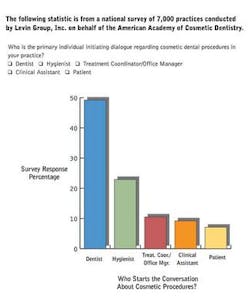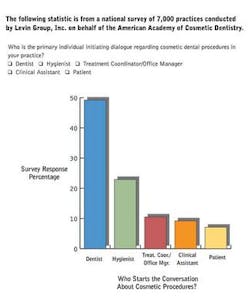Bonus? Yes or No?
As I present more than 100 seminars annually to dental groups and organizations, dentists often ask me privately about the effectiveness of bonus systems. Should your practice have a bonus system? Can a bonus system be the right solution for your practice and dental team? It can be, if you implement and design it properly.
What motivates people?
I was in a recent meeting with a vice president from a Fortune 500 company when he told me about his background. He is one of those people who started at the bottom and worked his way to the top. I asked him to tell me about his career path. When he started with the company, he worked in sales. He earned a small salary plus a significant bonus based on performance. During the first year, he became one of the top salesmen in getting leads for the company. In his annual review, his manager said that he had done an outstanding job getting leads and earned his bonus, but that the manager was disappointed the salesman had not done a better job closing contracts. The salesman politely replied that his compensation and bonus were based on getting leads, and that was where he had focused his energy.
The second year, the manager structured the contract so that the bonus was based on closes and not just leads. The more contracts the salesman closed, the higher his bonus. That year he became one of the leading salesmen in closing contracts. During the end-of-the-year review, his manager congratulated him on closing contracts, but expressed disappointment that he had not renewed more clients before their contracts ended - one of the parameters of the sales job. Once again, the salesman politely told his manager that his compensation and bonus were based on closes, and that was what he had focused on.
You can guess what happened the third year. As the top executive explained to me, people do what they are compensated to do. It creates a focus and desire to excel in that direction, and employees usually put all of their energy into achieving what they are paid to do. This is a positive argument for dental practice bonus systems if they are structured on strategically defined goals.
What type of bonus?
Many dentists do not know how to implement bonus systems effectively. In 2004, a future Levin Group client - let’s call him Dr. Brown - decided after little thought to implement a bonus system. He told his staff that if production increased by $200,000, each of them would get a $3,000 bonus at the end of the year. Nevertheless, production did not rise by $200,000 and practice revenues flattened.
After that, Dr. Brown enrolled in a one-year Levin Group Management program. He was frustrated that the practice was flat and concerned about his future. He blamed his staff for not being motivated and said, “If they only knew what to do, we wouldn’t have these problems.” It was a combination of factors, including leadership issues, team-building strategy, and staff motivation. After all, how can a team know what to do if no one has assessed what they need to learn, how they will acquire the information, and how to implement it in day-to-day systems?
Dr. Brown wanted a new bonus system as soon as he enrolled as a client. Our consultant explained that bonuses should not be considered until a practice has been in the program for six months. Dr. Brown learned that our method follows a set of principles, one of which is that basic business systems need to be documented and implemented step-by-step before considering bonus systems.
When trained properly, a staff is likely to make great strides in achieving a bonus. If the staff does not know what to do, a bonus will simply motivate them to do more of what they are currently doing, but not necessarily to do the right or most effective things.
Set the foundation first
After six months, Dr. Brown’s practice had placed effective systems and was performing better. The practice was on track for approximately 21 percent growth for the year. At this point, we discussed bonus systems. Prior to recommending a bonus system, we encourage clients to evaluate overhead, staff compensation relative to the market, the levels of turnover, and practice retirement programs. If all of these are within normal parameters, then a bonus is an excellent idea. If any of these is out of acceptable range, then the doctor needs to remedy it prior to offering a bonus system.
In Dr. Brown’s practice, he implemented a bonus system using a two-month cycle that allowed the staff an opportunity to grow with practice production. To his credit, Dr. Brown was willing to reward his staff as long as the practice did better. Prior to implementing the bonus system, he called a special meeting to explain how the bonus system would work. The staff had the opportunity to ask questions and voice concerns. As the doctor provided answers, the team understood that the bonus was not a giveaway program, but rather a direct opportunity to increase their specific incomes if the practice performed better.
Dr. Brown also explained that a bonus system is not an increase in base compensation, but is related specifically to performance. The best way for team members to achieve bonuses is to follow the data-driven systems the practice implemented during the first six months of the consulting program. He encouraged extra effort by team members to help the practice achieve higher levels of performance. After these points were made, the meeting ended with a very positive feeling.
To be effective, a bonus system requires leadership. For Dr. Brown, the first step was to post the results toward the bonus every day, even though it was a two-month cycle. In the beginning, the results looked paltry, but quickly added up. As the two-month cycle moved forward, Dr. Brown commented on the bonus during every morning meeting to keep staff motivation high. He reminded everyone that achieving the bonus depended on how well the staff implemented the systems, followed the guidelines and performed as a team. This type of leadership and cheerleading allowed excitement to build over the two-month period and reminded everyone constantly that they would be rewarded for excellent performance as a team.
The concept of a team bonus is critical in this scenario. The objective is to achieve teamwork, harmony and synergy, allowing the practice to function at the highest level. When a team is focused on a shared goal, they will work together toward its achievement.
The motivation behind the bonus
Good leaders motivate their team members to reach their potential. Dentists often need to act as cheerleaders and encourage teams to meet or exceed their practice goals. Bonuses should always be accompanied with some type of gift, such as flowers or candy. Bonuses are more than simply about money - they should be about achievement and appreciation.
By reminding your team about bonuses and helping them achieve them, you can demonstrate appreciation for your team, train staff members, and develop an inclusive practice culture. Another important factor is to always create excitement. Remind your team during every new bonus period what their opportunity is, post it in the staff room, mention it at morning meetings, and celebrate the wins.
The downside of bonuses is that sometimes your team will not reach its goal. Again, it is incumbent upon you to keep spirits high and remind team members that they have a chance again during the next period. Your team must understand that bonuses are not giveaway programs, but are earned based on practice and team performance. Continually remind your team that the bonus program is about achievement and moving the practice forward.
Summary
Bonuses can make a tremendous difference in the practice culture. A bonus system should be well-designed and aligned with practice goals before you present it to your team. A team that has not been properly trained will derive little benefit from a bonus system because they are not prepared to move the practice forward. Practices that have educated their teams on new systems will find that bonuses have long-term positive effects.
Leadership is a major component in implementing bonuses, and one factor that many practices overlook. Simply announcing a bonus and giving a paycheck is a short-term approach compared to your acting as a leader and motivating the team to achieve ongoing practice goals.
In Dr. Brown’s practice, he implemented a bonus system at the end of six months. By 12 months, the practice had achieved a 21 percent increase in growth and the team had received bonuses in three successive two-month periods. In the second year, motivation continued to remain high and the practice grew another 19 percent with the team missing only one bonus period in the second year. Occasionally missing a bonus period can be as motivating as receiving the bonus because it reminds team members that bonuses are not automatic and must be earned as a team based on practice growth. A bonus is most effective with the right leadership messages in combination with the right systems.
Roger P. Levin, DDS, is founder and CEO of Levin Group, a leading dental practice-management consulting firm that is dedicated to improving the lives of dentists through a diverse portfolio of lifetime services and solutions. Since the company’s inception in 1985, Dr. Levin has worked to bring the business world to dentistry. A popular lecturer, Dr. Levin addresses thousands of dentists and staff worldwide each year in 100-plus seminars and at the dental industry’s most prestigious meetings.

